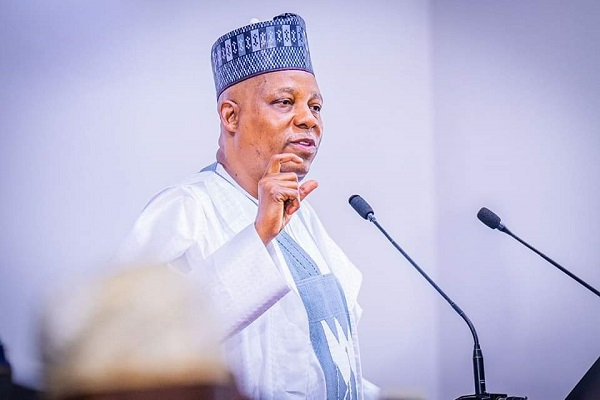The federal government has launched a new initiative to establish an operating model and framework for Economic and Financial Inclusion, aiming to transform Nigeria into a $1 trillion economy by 2030.
The project is designed to combat poverty and catalyse sustainable economic growth from the ground up.
Vice President Kashim Shettima said the initiative symbolises the commitment of the President Bola Ahmed Tinubu administration to enhancing financial and economic inclusion across Nigeria.
According to a statement by his spokesman, Stanley Nkwocha, Senator Shettima spoke on Wednesday during the Kick-off meeting for the initiative to set up an Operating Model for Economic and Financial Inclusion for the Office of the Vice President.
The federal government had on April 25, 2024 unveiled the Aso Accord on Economic and Financial Inclusion, a multi-pronged blueprint designed to achieve universal access to financial services.
The accord represents a core pillar of the administration’s Renewed Hope Agenda to transform the nation into a $1trillion economy by 2030, while combating poverty and insecurity through broad-based prosperity.
Addressing members of the team and other stakeholders at the maiden meeting, the Vice President noted that the idea is to provide access to capital and eradicate poverty through legislative interventions and critical policies.
According to Shettima, at the heart of every strategy championed by President Tinubu, there has been the need to prioritise inclusive economic growth and development.
He listed some positive results the efforts have yielded to include the recent upgrade of Nigeria’s credit outlook to positive by Fitch Ratings, noting that it is in recognition of the reform progress under President Tinubu.
“While such an upgrade by a distinguished institution reflects growing confidence in our economic trajectory, particularly in light of policy changes aimed at easing our debt service burden, we remain mindful of the short-term impacts of these reforms.
“Hence, we are prioritising measures to mitigate immediate effects, from the Student Loan Act, which democratises access to education, to the relentless efforts of the Federal Ministry of Agriculture and Food Security in combating food insecurity”.
VP Shettima pointed out that due to the administration’s belief that its approach to inclusive growth must be strategic and sustainable, economic and financial inclusion was elevated to the agenda of the National Economic Council (NEC), where all governors of the 36 states and the FCT minister participate in crucial policy deliberations alongside other stakeholders.
He implored members of the implementation team and all stakeholders involved in the initiative to recognise the weight of their responsibility, saying what they have at hand is a vital national assignment.
The Vice President stated: “You have been entrusted with a vital national assignment, and I have full confidence that you will bring your best efforts to ensure its success.
“As we embark on this essential initiative, I call upon each of you to contribute your insights, expertise, and dedication. Only through such resolve and discipline can we forge a robust operating model that will drive economic and financial inclusion across our nation, ensuring every Nigeria has the opportunity to thrive.
“I also implore the implementation team to engage all stakeholders fully. There is no greater calling than developing solutions to alleviate the impact of ongoing economic reforms on over 30 million financially excluded Nigerians, propelling Nigeria towards sustainable and inclusive growth”.
Also speaking during the meeting, Technical Advisor to the President on Financial Inclusion, Dr. Nurudeen Abubakar Zauro, reported substantial progress in implementing the Aso Accord on financial inclusion and a series of initiatives aimed at broadening financial access across the nation.
Dr. Zauro, while acknowledging the role of Vice President Shettima in supporting the signing of the accord and ongoing implementation, reported that discussions on financial inclusion have now reached the highest levels of government, including NEC.
“Since its signing, the operationalisation of the accord has received funding from the Bill & Melinda Gates Foundation through the Lagos Business School (LBS),” Dr. Zauro said.
He further explained: “We have been setting up the operating model and legal framework to ensure that the project takes off smoothly and is aligned with the Renewed Hope Agenda. “Working on the team are also Augmentum Advisory, Banwo & Ighodalo, and Ndarani (SAN) & CO.,” Dr. Zauro said.
He disclosed that the team is planning capacity-building initiatives and “high-profile training for permanent secretaries and Commissioners of Finance to ensure that practical knowledge on financial inclusion would be injected where they are needed.”
Earlier, the Project Manager at the Lagos Business School, Prof. Olayinka David-West, commended the Tinubu administration for putting economic and financial inclusion on the front burner by signing of the Aso Accord earlier in April.
She said the team at the Lagos Business School working with its counterpart in the VP’s office and other stakeholders is looking at the legal framework for financial inclusion as well as giving the initiative the convening power, and national coordination to drive ownership across the country.
The project manager said though the Lagos Business School collaborating with other partners has over the years made deliberate efforts at entrenching financial inclusion across the country, the initiative of the present administration will serve as a gateway to successfully operationalising the policy nationwide.
Prof. David-West said the engagement with the Vice President seeks to identify the right platforms and structures aimed at galvanising the relevant authorities to key into the initiative.
Also present at the meeting were the National President of Association of Mobile Money and Bank Agents in Nigeria (AMMBAN), Mr Fasasi Sarafadeen; Senior Lecturer, Lagos Business School, Dr Nkemdilim Iheanachor; Project Leader, Augmentum Advisory, Mr Kolajo Ajibola, and the Project Team Lead, Mr Stephen Abure, among others.











